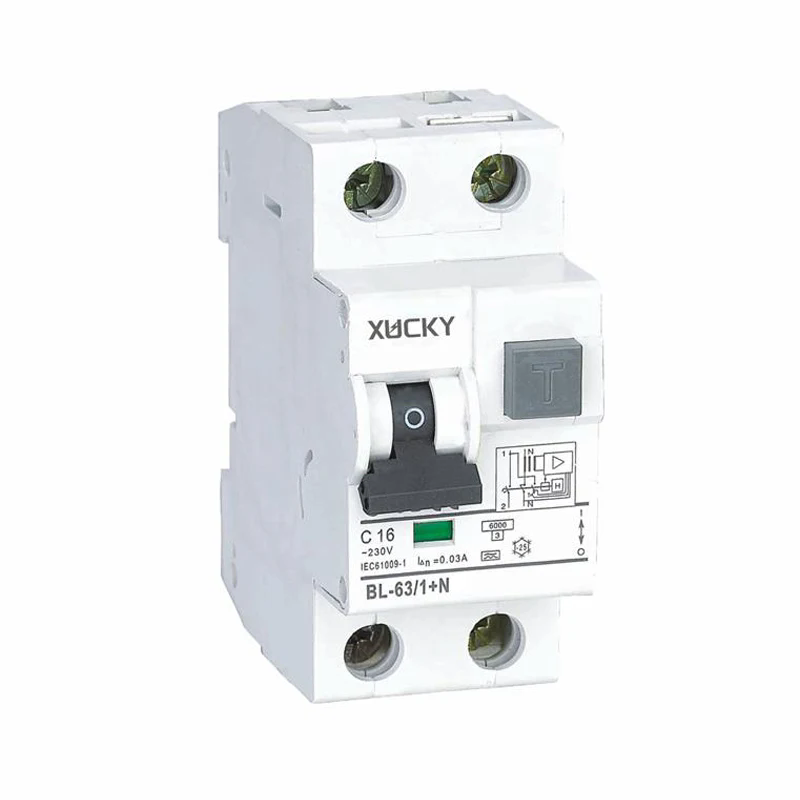RCBO Circuit Breaker: Ensuring Safety and Reliability in Electrical Systems
2025-05-07
In the world of electrical safety, circuit breakers play a pivotal role in protecting both people and equipment from potential hazards such as electrical overloads, short circuits, and earth leakage. One of the most advanced and effective types of circuit breakers is the RCBO (Residual Current Breaker with Overload Protection). Combining two essential functions—overload protection and earth fault protection—RCBO circuit breakers are a key component in safeguarding electrical installations, particularly in residential, commercial, and industrial settings.

What is an RCBO Circuit Breaker?
An RCBO is a safety device that integrates the functions of an overcurrent protection circuit breaker and a residual current device (RCD) into a single unit. The RCBO offers dual protection:
1. Overload Protection: Similar to a standard circuit breaker, the RCBO prevents damage to electrical circuits by disconnecting the power supply when the current exceeds the specified rating for an extended period. This helps prevent overheating, which can lead to fires and equipment damage.
2. Residual Current Protection: The RCBO also includes a residual current function, which detects earth leakage or ground faults. This feature is critical for protecting users from electric shocks caused by leakage currents, often due to damaged insulation or faulty wiring.
By combining these two functionalities, the RCBO provides comprehensive protection for electrical systems, ensuring both the safety of the electrical installation and the well-being of individuals using it.
How Does an RCBO Work?
The RCBO works by continuously monitoring the current flowing through an electrical circuit. Here’s how it operates:
1. Overload Detection: When the electrical current exceeds the set rating for a circuit, the RCBO detects the overload condition. This may be due to excessive current demand by connected appliances or equipment. Once the overload is detected, the RCBO interrupts the circuit to prevent damage, protecting both the wiring and the devices from overheating or potential fire risks.
2. Earth Leakage Detection: The RCBO also monitors the difference between the live (phase) and neutral wires. Under normal conditions, the current flowing into the live wire should equal the current flowing out of the neutral wire. If there is a discrepancy, this indicates that some current is leaking to earth (ground), which could be hazardous to human health. The RCBO detects this imbalance and trips the circuit if the leakage current exceeds the threshold, preventing electric shock and minimizing the risk of electrical fires.
Benefits of Using an RCBO Circuit Breaker
1. Enhanced Safety:
The most significant advantage of the RCBO is its ability to provide dual protection—overload protection and earth fault protection. This combined function makes it a more effective and reliable safety device than individual circuit breakers or RCDs, ensuring that both electrical equipment and people are protected from potential hazards.
2. Prevention of Electric Shocks:
The RCBO’s residual current detection function is especially important for preventing electric shocks. In the event of a ground fault, where electricity flows through unintended paths (such as a person), the RCBO will immediately disconnect the circuit to prevent injury or even death. This is especially critical in environments where moisture, such as bathrooms or outdoor settings, increases the risk of electric shock.
3. Fire Prevention:
Overload conditions and earth leakage can both lead to electrical fires. The RCBO’s ability to trip the circuit when either of these conditions is detected helps to mitigate the risk of fires caused by faulty wiring, damaged appliances, or overburdened circuits.
4. Reduced Downtime and Maintenance Costs:
By preventing damage to electrical circuits and devices, the RCBO helps reduce the need for costly repairs or replacements of electrical components. Additionally, since the RCBO provides both overload and earth fault protection in one device, it simplifies installation and maintenance, reducing the overall cost of electrical system upkeep.
5. Compact Design:
RCBO circuit breakers are typically compact and easy to install, making them ideal for use in both residential and commercial electrical systems. Their small size ensures that they can be easily incorporated into electrical panels, even in limited spaces, without taking up much room.
6. Compliant with Electrical Standards:
RCBOs are designed to meet national and international electrical safety standards, ensuring that they provide reliable and effective protection. Many jurisdictions require the installation of RCBOs in specific locations (e.g., bathrooms, kitchens, or outdoor areas) to meet regulatory compliance for safety.
Applications of RCBO Circuit Breakers
RCBO circuit breakers are used in various electrical installations, particularly in environments where safety is paramount. Here are some of the key applications:
1. Residential Electrical Systems:
In homes, RCBOs are used to protect individual circuits from overloading and earth faults. They are particularly beneficial in areas with high water usage (e.g., bathrooms and kitchens), where the risk of electric shock is higher. RCBOs are often installed in consumer units (fuse boxes) to ensure the safety of all electrical circuits.
2. Commercial Buildings:
RCBOs are widely used in commercial settings, such as offices, shops, and restaurants, to protect electrical installations and ensure the safety of employees and customers. In these environments, electrical systems are often complex, and an RCBO can help ensure that both overloads and earth faults are quickly detected and mitigated.
3. Industrial Applications:
In industrial environments, where high-power equipment is in use, RCBOs are critical for safeguarding electrical systems against overloads and electrical faults. The ability to protect sensitive machinery and personnel from electrical hazards makes the RCBO an essential component in industrial electrical setups.
4. Outdoor and Temporary Installations:
RCBOs are commonly used in outdoor electrical installations, such as construction sites or temporary power setups, where the risk of electrical faults and earth leakage is higher due to exposure to the elements. The RCBO’s ability to quickly disconnect the circuit in case of an earth fault is crucial in preventing accidents in these settings.
Conclusion
The RCBO circuit breaker is a vital safety device that provides both overload protection and residual current protection, making it an essential component in modern electrical systems. With the increasing need for safety in both residential and industrial applications, the RCBO ensures that electrical installations are safeguarded from overloads, short circuits, and earth leakage, reducing the risk of electric shocks, fires, and equipment damage. Whether in homes, offices, or factories, the RCBO offers a compact, reliable, and cost-effective solution for electrical safety, contributing to the protection of people and property from electrical hazards.


